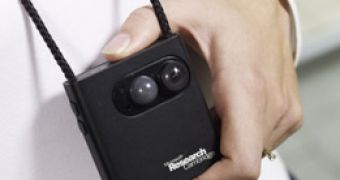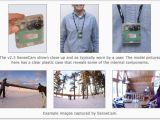SenseCam, a project from Microsoft Research’s Cambridge (UK) laboratory, is designed to help recall inaccessible memories for patients suffering from amnesia as well as neurodegenerative diseases (Alzheimer’s). According to information in a JNNP study, SenseCam technology is capable of bringing back to life previously inaccessible memories for people suffering from memory loss. The Redmond company indicated that functional Magnetic Resonance Imaging studies revealed that SenseCam images were capable of making users actually remember, by influencing a natural recollection of experiences. The technology enabled people with diagnosed memory loss conditions to recall the complete experience from thoughts to feelings and to the actual events beyond what the SenseCam captured in images.
“It’s clear that SenseCam has a huge potential both as a memory aid and as a tool for clinicians to better understand cognitive brain functions and further advance the study of neuroscience,” revealed Dr Steve Hodges, principal hardware engineer and manager of the sensors and devices group at Microsoft Research Cambridge.
Microsoft Research UK has designed SenseCam as a wearable digital camera. The technology functions without any user intervention, taking snapshots that are replicas of the patient’s field-of-view. SenseCam can store as much as 30,000 images (at a VGA resolution of 640X480 pixels) on 1GB of Flash memory.
“We’re really excited to be able to extend the project to actively involve so many leading researchers and clinicians around the world. Ultimately, if we can conclusively demonstrate that SenseCam can improve memory, and thereby the quality of life, in patients with amnesia and memory loss from neurodegenerative diseases such as Alzheimer’s, that would be an absolutely tremendous result,” Hodges added.
The software giant emphasized that SenseCam manages to best all other products designed to improve memory, including calendars and diaries. Because the technology permits patients to record and review past events from an external source, people suffering from memory loss are capable of improving their autobiographical memory.
“Until now, the neural basis for our patient’s memory improvement has been unknown” stated Dr Emma Berry, clinical neuropsychologist at Addenbrooke’s Hospital in Cambridge and the University of Hertfordshire. “But through the results of this study, we’ve found evidence to suggest that these events were remembered and not just learned from excessive exposure of the SenseCam images. Our fMRI study shows that when she looks at the images, she not only remembers the event, which is incredible given the level of her amnesic syndrome, but that she activates parts of the brain associated with normal episodic memory.”

 14 DAY TRIAL //
14 DAY TRIAL // 
